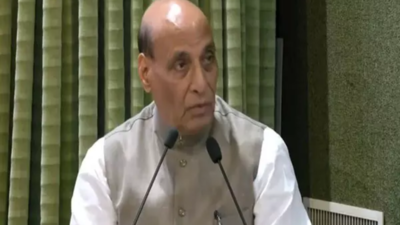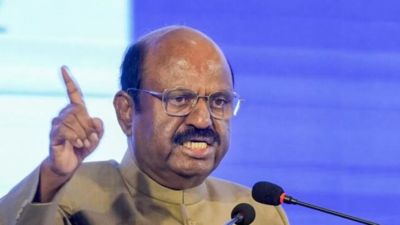Rajnath Singh to head to China for key SCO defence talks; anti-terror focus tops agenda- first high-level visit since Ladakh standoff | India News

NEW DELHI: Union defence minister Rajnath Singh will travel to Qingdao, China, on Wednesday to attend the Shanghai cooperation organisation (SCO) defence ministers’ meeting. This marks the first visit by a senior Indian minister to China since tensions flared along the Line of Actual Control (LAC) in eastern Ladakh in May 2020.In a post on X, Singh said, “Today, 25th June, I shall be leaving for Qingdao, China, to take part in the Shanghai cooperation organisation (SCO) defence ministers’ meeting. ““I will have the opportunity to interact with various Defence Ministers on a wide range of issues. Looking forward to present India’s vision for global peace and security and also, call for joint and consistent efforts to eliminate terrorism,” he added.During the visit, Singh is expected to engage in bilateral discussions with his Chinese and Russian counterparts, with the agenda likely to cover a wide range of regional and global security issues, including the ongoing tensions in West Asia.In a press release, the ministry of defence said, “Raksha Mantri is expected to highlight India’s continued commitment to the principles and mandate of the SCO, outline India’s vision towards achieving greater international peace & security, call for joint & consistent efforts to eliminate terrorism & extremism in the region, and stress on the need for greater trade, economic cooperation and connectivity within SCO. The SCO, established in 2001 by China, Russia, Kazakhstan, Kyrgyzstan, Tajikistan, and Uzbekistan, is a regional political, economic, and security alliance. India became a full member in 2017, followed by Iran. The organisation now serves as a key platform for India to engage with major regional players, including Central Asian countries, on issues of security and cooperation.India uses the SCO to address its concerns over cross-border terrorism, particularly from Pakistan, and to push for action against UN-proscribed terror groups. The forum also provides New Delhi with an opportunity to counterbalance China-led narratives by promoting its own vision of a free, open, and inclusive regional order.Strategically, the SCO allows India to manage complex ties with both China and Pakistan while deepening its longstanding partnership with Russia and expanding engagement with Central Asia. It also supports India’s broader connectivity goals through initiatives like the International North-South transport corridor and the Chabahar Port, even as India remains cautious of China’s Belt and Road initiative.




